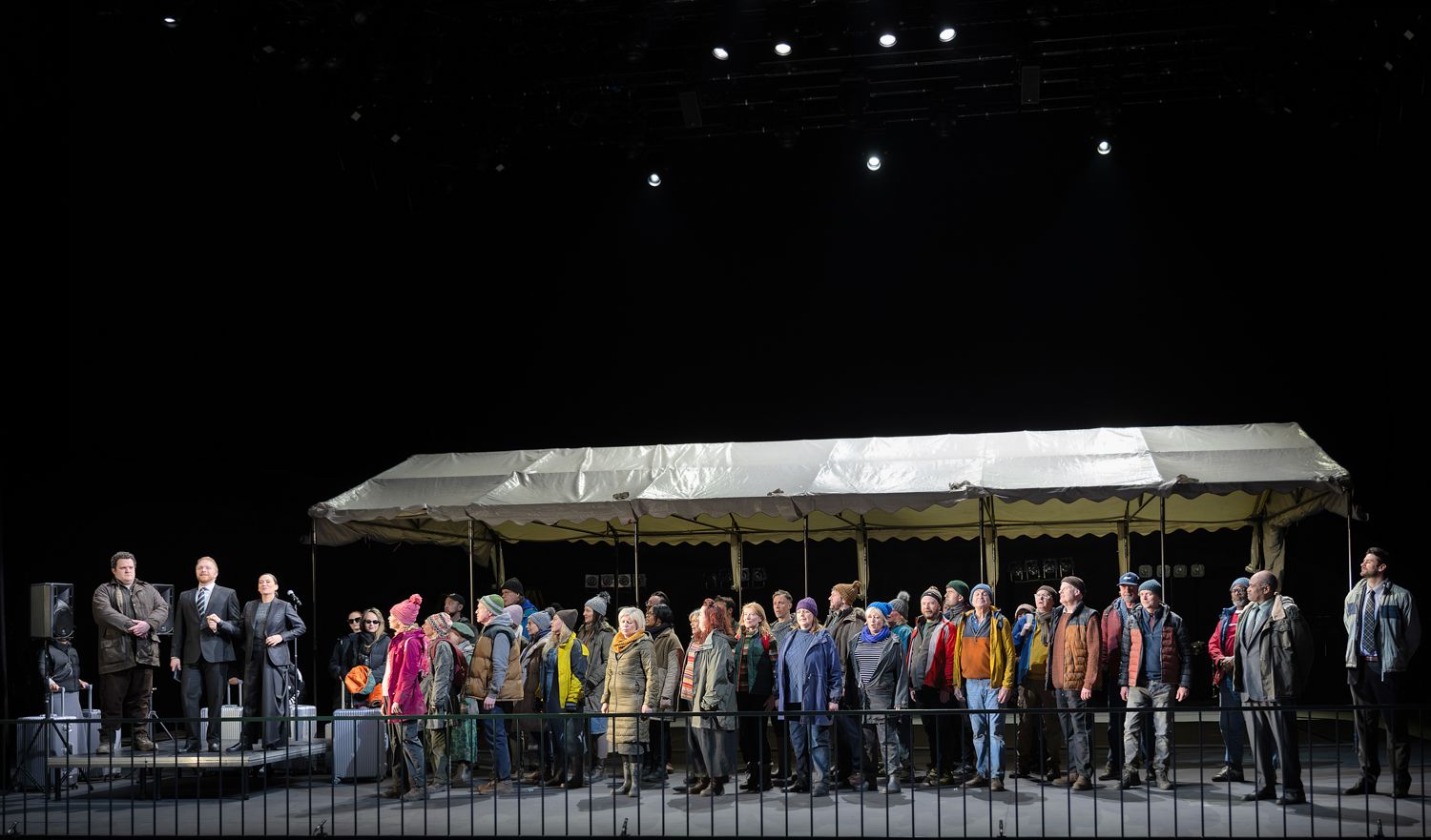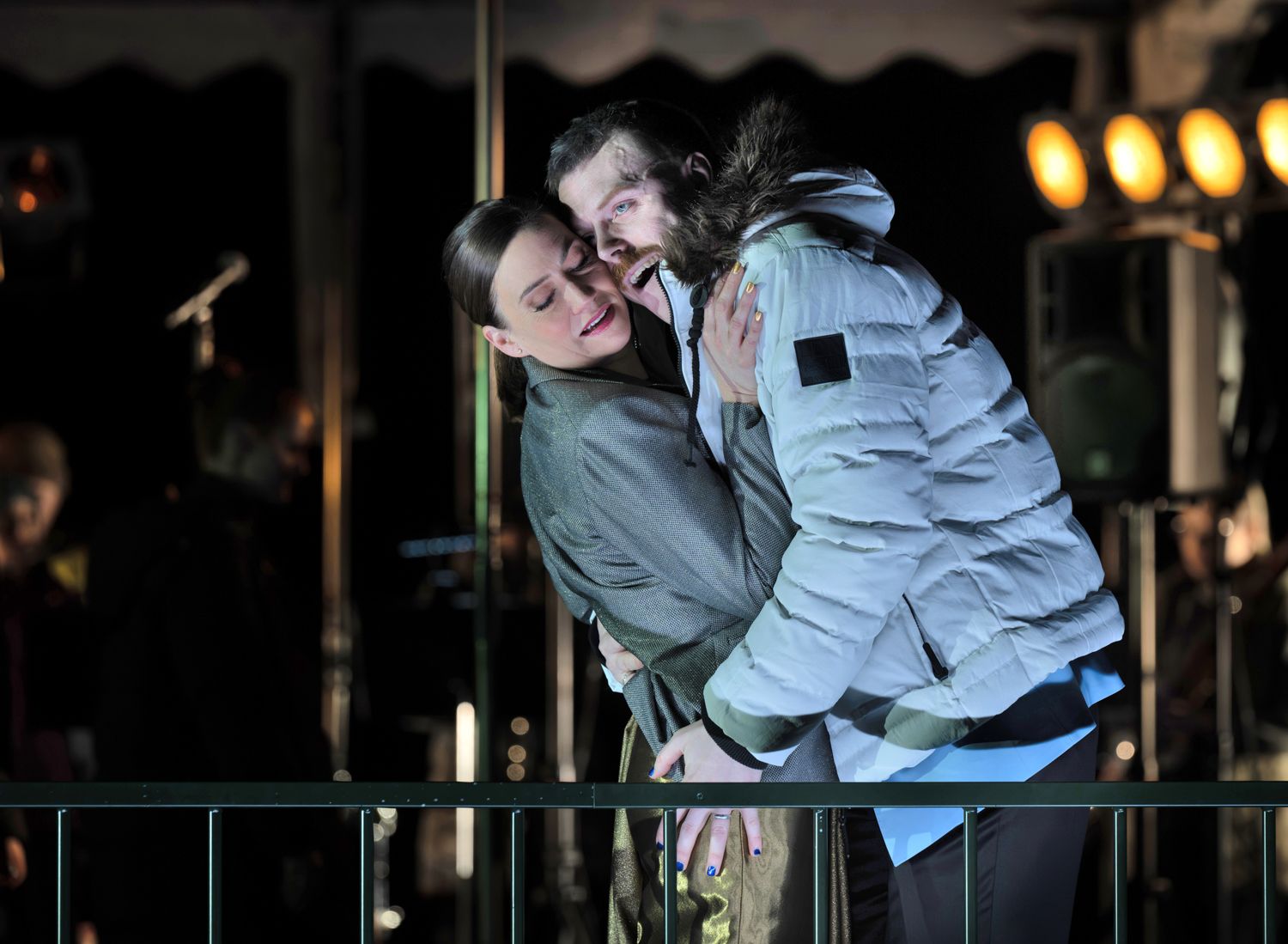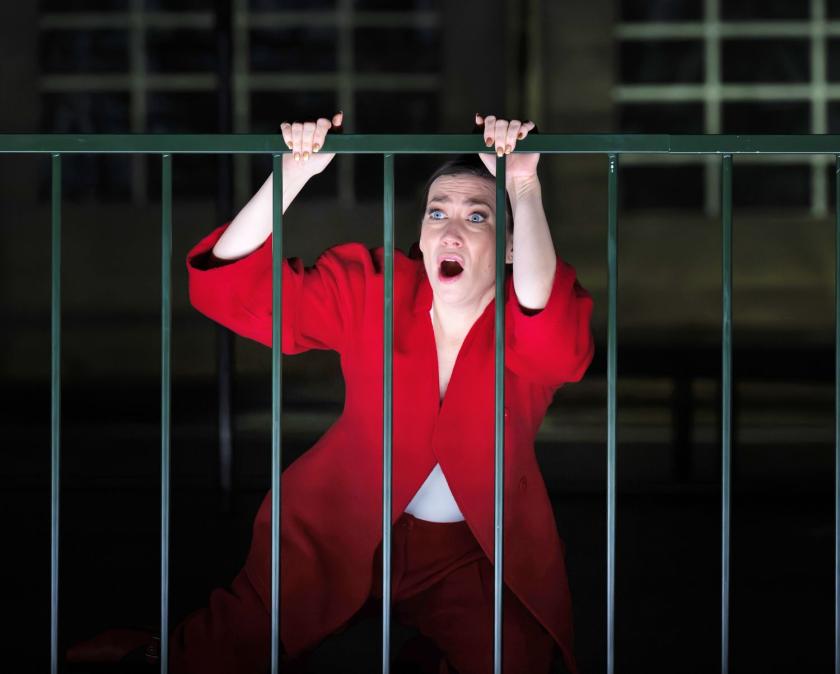Genius doesn't always tally with equal opportunities, to paraphrase Doris Lessing. Opera houses have a duty to put on new works by women composers; sometimes an instant classic emerges. But to revive a music drama that hardly made waves back in 1977? Thea Musgrave’s Mary, Queen of Scots has some strong invention, and whizzes you through historical bullet points so quickly that there’s no chance to get bored. But does it deserve a company giving it their all?
It certainly deserved better dressing-up than it gets from designer-director Stewart Laing. This looks like one of those black-box productions former music director Mark Wigglesworth proposed to keep English National Opera running for a full season. Much could still have been done with lighting (there’s some variety in DM Wood’s work, not enough), but the marquee skeleton in the big black space variously covered, sometimes to no purpose at all, rarely suggests a sense of place.  Stripping away the glamour and setting a period drama in Scotland now could at the very least have delineated between courtiers and populace, but has nearly everyone in woolly hats and waterproof jackets (always cold and wet, Scotland, you know. And amazingly there was an “associate costume designer”). Despite time passing between Acts One and Two, the men don't get a change of garb. Laing‘s chief virtue as director is to keep most of the singers at the front of the stage, with the green railings at the front effective at one point as a kind of prison for our protagonist.
Stripping away the glamour and setting a period drama in Scotland now could at the very least have delineated between courtiers and populace, but has nearly everyone in woolly hats and waterproof jackets (always cold and wet, Scotland, you know. And amazingly there was an “associate costume designer”). Despite time passing between Acts One and Two, the men don't get a change of garb. Laing‘s chief virtue as director is to keep most of the singers at the front of the stage, with the green railings at the front effective at one point as a kind of prison for our protagonist.
The valiant soloists mostly have to deal with an unvarying declamatory style which, while it isn’t all over the shop like a lot of contemporary vocal writing, demands so much full-pelt at the top of the voice against an often loud orchestra that you fear not everyone might last the run (in fact there are only two performances, an insult to all the time and effort that's gone into the musical preparation - though at least the production is shared with San Francisco Opera). American soprano Heidi Stober turns in a totally committed performance both vocally and dramatically. Her biography – you have to look it up, since disgracefully there is none in the flimsy programme which only a few of us got on first night – suggests she’s only sung lighter lyric roles, but on the strength of this we have to hear her Salome.  Rupert Charlesworth (pictured above with Stober) sings gamely to the very limit as the feckless Darnley, though he gets even less grateful lines to sing, not even a proper wooing, achieved with a couple of flattering cliches – the breathless libretto is Musgave's – and no love music at all. Each character exists in one dimension only: Mary is lonely, Darnley dissolute, the Earl of Moray (Alex Otterburn, fine) power-hungry, Bothwell (John Findon, having to execute an awkwardly-staged rape of his queen in Act 3) bellicose. Barnaby Rea’s David Riccio gets to sing one of the few set-pieces; as there’s little musical contrast between characters, the only relief comes in ballads and courtly dances, though those have the weakest staging of all, with zero choreography to underline the arrival of an Italian tarantella; the titled folk just shuffle aimlessly to every style. Rather too late, we get a lullaby for the infant James in Act Three from Queen Mary and one of the four serving lady Marys, Seton (Jenny Stafford), but Britten’s masterclass of set-pieces in Gloriana finds no echo in Musgrave’s predominantly doomy lingua franca, all too typical of its time.
Rupert Charlesworth (pictured above with Stober) sings gamely to the very limit as the feckless Darnley, though he gets even less grateful lines to sing, not even a proper wooing, achieved with a couple of flattering cliches – the breathless libretto is Musgave's – and no love music at all. Each character exists in one dimension only: Mary is lonely, Darnley dissolute, the Earl of Moray (Alex Otterburn, fine) power-hungry, Bothwell (John Findon, having to execute an awkwardly-staged rape of his queen in Act 3) bellicose. Barnaby Rea’s David Riccio gets to sing one of the few set-pieces; as there’s little musical contrast between characters, the only relief comes in ballads and courtly dances, though those have the weakest staging of all, with zero choreography to underline the arrival of an Italian tarantella; the titled folk just shuffle aimlessly to every style. Rather too late, we get a lullaby for the infant James in Act Three from Queen Mary and one of the four serving lady Marys, Seton (Jenny Stafford), but Britten’s masterclass of set-pieces in Gloriana finds no echo in Musgrave’s predominantly doomy lingua franca, all too typical of its time.
Orchestrally, there’s a fair bit of interest: an anxious cor anglais comments on Mary’s isolation, woodwind collectively trill and are underpinned by an ominous bass clarinet, while tuckets and fanfares are decently done. Conductor Joana Carneiro is fully in command of the hard hits. The writing for the masses is only partially successful, but sung as always with conviction by the ENO Chorus. The donnée of a woman completely surrounded by threatening men could have yielded genuinely shocking and involving results, but Musgrave quickly squanders her capital. In a week where this second coronation, a first for a London opera company, has to follow Turnage’s Festen and the UK premiere of MacMillan’s Ordo Virtutem, that’s all the more apparent.















Add comment